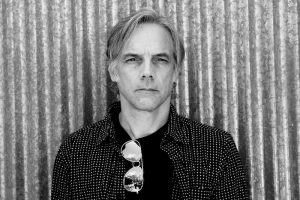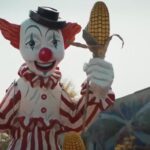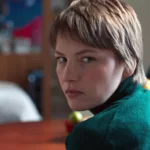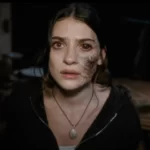Deniz Tek earned his rock and roll stripes as the architect behind Radio Birdman. Tek played guitar and wrote a seminal batch of songs, the first of which appeared on 1977’s Radios Appear. These days, when Birdman are on hiatus, Tek can be found working on material for his solo albums. The latest, Mean Old Twister, stands alongside the best work in his canon. As something of a ‘call to arms’, the album art features one of the most influential guitars in garage rock. Sean Sennett caught up with Tek to discuss his new work, his writing process, the future of Radio Birdman and Tek’s great love, The Rolling Stones.
I was curious about the guitar on the front cover. What’s the story behind that? That’s not “the” guitar, is it?
On the front of the CD (the LP has a different cover) that’s the top half of the body of my old ’65 Epiphone Crestwood that I’ve had forever.
The one you bought from Fred “Sonic” Smith. Did you buy that directly from him or was it in a shop?
I got it from a third party, a guy that bought it from Fred, and I bought it from him. This guy was a middle man whose name was Fred also, Fred Stoll. He had gone to this auction when the MC5 split up. They sold off a bunch of their equipment, and a couple of the guys Michael Davis and Wayne Kramer were going to prison. So they sold off a bunch of their stuff.
This guy Fred Stoll, who’s another Ann Arbor kid, showed up and scooped some of the stuff up and then turned it around immediately and sold it. I saw his notice for it on the notice board at Campus Corners drugstore. I called the number, and went and checked it out, and got the guitar from him. That was in 1973.
Amazing. It’s had some good service since then.
Yeah. One of the things that was up for sale at that time was Wayne’s famous American Flag Stratocaster. Nobody bought it. Nobody wanted it, and Wayne later told me he has no idea what ever happened to it. It didn’t sell at that time, and then he went off to prison in Lexington. Then when he got back everything was gone.
Does the Crestwood appear on the record or is it in a sealed storage room somewhere?
No, I still get it out and play it. It was pretty beat up and it had a lot of bare wood on it, so I stopped taking it out on the road for a while. All that bare wood would just soak up moisture and humidity on stage, and then it would lose all of its tone about halfway through the show.
I had it dried out and refinished by this guy in Sydney who’s a master guitar finisher. He lacquered it. He put a clear coat of lacquer on it, so you can still see all that bare wood, but it’s got a thin coat of impervious lacquer so it’s quite playable again now. I took it out on the road again in 2014, on the Birdman tour. I still use it in the studio.
This new batch of songs, did you set aside time to write a new album or were you pulling in ideas that had been around for a while? What was the process with the writing?
Most of it’s new, or was new in the last three years. Although there’s a couple of older pieces on there. I think there’s two songs on there that were sort of rejects from the songs we (Radio Birdman) wrote for Zeno Beach. One of them was called “Somewhere” and one is “New York Confidential”. Those were in the 20-odd songs or so that we rehearsed for Zeno Beach and then we decided not to put them on the album. I thought they were still good songs for me to do, so I resurrected them for this project.
I’m sure when everybody in Birdman hears “Burned Black” they sort of sigh that they didn’t get that song.
That was one of the ones that was written just new for this project. It’s a pretty straight-ahead rocker, that one, and “Prison Mouse” could easily be a Birdman song, although I don’t know if Rob (Younger) would want to sing those lyrics. That’s the other thing about Radio Birdman is that he has to pick and choose the lyrics he feels comfortable singing, because he’s the guy that has to deliver them out front. There’s a lot of songs I’ve written that could conceivably be Birdman songs but are not because just Rob didn’t feel comfortable with it.
Getting away from lyrics completely with the instrumental “Comanche,” it feels like a distant cousin of “Apache”. Was that something you wrote in the studio or had around for a while?
I didn’t write it in the studio, but I wrote it to be sort of a tribute for the song “Apache”. I wrote it with “Apache” in mind. I realized you could sort of turn the riff inside out, and change the chording and the choruses, and have something almost equally as cool as “Apache”. That’s how that came about, just messing around with the tunes.
You’ve got to get your publisher to send that to Quentin Tarantino. It would sound great on a film.
I’ve been trying to get material to Quentin Tarantino for years, and I don’t know how to get things into his ear. If anybody out there has a contact, let me know. I would love, love to send him some stuff.
There’s a real urgency in the record. I was wondering once you got to the States to record, how long did it take to make the album?
All the backing tracks were done in two days. Ric Parnell is an extraordinary session drummer, and we just book him into the studio. I show up with the songs, and I play rhythm guitar, and he plays drums. I show him how the song goes, and he listens to it a couple of times, and then we play it together a few times, and he works out a beat for it. Then we roll tape and put it down. So we were able to get all those rhythm tracks down in two days. Then it was just a matter of filling in the rest of it over several months, when the opportunity presented itself.
Was it all recorded in America or did you do some in Australia as well?
No, it was all recorded in America, mostly in Montana. The rhythm tracks were done at Ron Sanchez’s studio in Bozeman. A lot of the guitar overdubs and vocals were done at Bob Brown’s studio in Billings. Then we did other stuff in Hawaii.
The thing I’ve often enjoyed, apart from the guitar playing and the energy is the fact you’ve got a great way with the lyric, and there’s a novelist’s gift for small details that you put into your lyrics. You must be particularly happy with the lyrics on this record.
I am. It was write and rewrite and fuss over the lyrics more than anything. To me, that’s the hardest part of it these days. In the old days, I was quite happy to just write any nonsense, and as long as it sort of sounded good with the tones, it was fine. But now I think it’s important to have some meaning behind it.
Given your lyrics are so good, I was curious if you are a big reader?
Yeah, I read all the time. I always have. Since childhood I’ve been an avid reader. I read two or three books a week if I have enough time. I read everything from classics, to novels, to nonfiction, to biographies. As long as the writing is good writing, I have a pretty wide range of subject matter that I will read. If the writing is bad, I’ll read 20 pages and then toss it.
Thinking back to when you started out, everybody knows you’re heavily influenced by the music coming out of Detroit. When you hit Australia I was wondering if AC/DC or Vanda & Young had any impact on you as a young man?
The Easybeats did. I was a big fan of the Easybeats. I didn’t really become very familiar with them until I spent a year in Australia in 1967. And the only thing they had that was a hit in America was “Friday On My Mind”. Everything else was completely unknown territory. I loved the Easybeats.
AC/DC not so much, I mean they were around the same time. We were starting out and they were kind of starting out about the same time. There was a brief period of time when we regarded them as sort of rivals in the hard rock area. Of course, that lasted about five seconds, and then they skyrocketed into orbit, and we stayed in Darlinghurst.
Did you ever play on the same bill?
I don’t think so, although in TV Jones I played on the same bill with Stevie Wright, I think that’s the closest I ever came to those guys.
What’s the plan with the album now? I’m not sure if you’ve toured it overseas or if you’re intending to play the rest of the cities around the country you haven’ played yet.
First of all, overseas, yes. In fact, I’ve spent my morning trying to book airline tickets and things like that. We’re going to be doing a short tour of America first in March, and mostly focusing on the two coasts, skipping the middle, and then we’re going to Europe for a month. It’s going to be a pretty solid month, probably 26 or 27 gigs in April around Europe to promote the album. When that’s over I’ll be coming back to Australia and getting ready for a national Birdman tour, which will happen in June.
As far as more gigs in Australia to promote Twister, probably not. It’s just becoming very difficult nowadays. It’s financially very difficult to tour around Australia with something at my level.
You obviously feel very happy now that Birdman are back together and doing things. There was a while there you kind of indicated that Birdman was on the blocks for good, but now it’s rejuvenated.
We thought it was on the blocks for good a couple of times. I don’t think we ever really announced anything about it but we broke up in 1978. We didn’t get back together until 1996. Again, I think the next time I thought it was really finished was at the end of 2007.
We had a big year that year. I think we’d done 80 concerts that year around the world, and got put in the Hall of Fame, and did all of that. But at the same time, we lost our drummer at the end of that tour. Our keyboard player was gone, and so it’s like ‘Yeah, this is the end’. We weren’t getting along with Chris (Masuak). There was a big problem within the band. It was essentially impossible to continue. We thought rather than make a fuss or scene about that, let’s let it die right there. Then we won’t have to worry about it.
Then the problem came up again when we wanted to get back together seven years later in 2014, for the release of the boxset, and we wanted to do some gigs to promote that. But then we said okay, we want to do some gigs to promote that, but we’re in the same spot we were in at the end of 2007. We have an untenable situation within the band. We have to resolve it one way or the other. So we decided to go on without Chris. We auditioned some drummers, and got a drummer. We got a guy that had played with us before, Nik Rieth, and Pip (Hoyle) came back.
With the album, there are so many different textures on there. When we get to “Table for One,” there’s a bit of a Stones feel. Do you still go back to that music for inspiration, or is it just part of your DNA now?
I think it’s part of the DNA. I don’t listen to it specifically for inspiration or to get writing ideas. But I listen to it all the time anyway. It’s always there. I was just listening to Rolling Stones records yesterday. I can’t get enough of it.I was playing Let It Bleed, and then I listened to some of Keith’s solo stuff, with the New Barbarians. I listened to a live tape of a New Barbarians show.
I love those mid-sixties singles. People forget what a great lyricist Mick Jagger was. A lyric like “Get Off My Cloud” is just the best.
Oh, yeah. It’s fantastic. I remember the first time I heard “Get Off My Cloud”. I was out kicking a football around with some friends in the snow, in Ann Arbor, and we’re about 13-years old, playing football in a snowstorm, and then hearing that on the radio.
The Rolling Stones were the defining force for me in the ’60s. Not just the recordings, but actually getting to see them in Detroit in 1969 was extraordinarily huge in my life. It was one of those events in your life where you say this is a turning point. This is something that is so important that this is going to change the way I approach everything from here on. It was one of those moments.
The bill was Terry Reid, who opened, and then B.B. King, and then the Stones. Of course, it was supposed to start at 8 o’clock, and the Stones didn’t actually go on until 2 in the morning. It was in a little hockey stadium called Olympia in Detroit and probably 8,000 seater. They were notorious on that tour for being late all the time. It’s probably getting Keith to wake up, but it was so worth it. Such a mind-blowing concert.
Deniz Tek’s Mean Old Twister is available here http://www.citadel-records.com/releases/deniz/twister/deniz_tek_mean_old_twister.html
James Williamson and Deniz Tek’s ‘Acoustic K.O.’ EP is out on March 31, 2017
Photo Credit: Anne Tek




